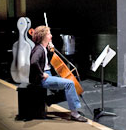Musicophilia: Tales of Music and the Brain, by Oliver Sacks
 Editor's Abstract
Editor's Abstract
Since I do lot of teaching I read a lot of books. Not all of them are music-related, but a high proportion of them are. From time to time in this space I’ll be posting reviews of books I’ve read, with the hope that 1) you’ll be able to sort through books more quickly (as to whether you really want to spend the time reading them) and 2) you’ll read something that you might not have otherwise considered. Enjoy!
Yvonne Caruthers
“Years ago when I read a biography of Maurice Ravel, I learned that at the end of his life he was afflicted with a condition that allowed him to hear music but not be able to write any of his musical thoughts on paper. To say that he was frustrated by his condition would be a gross understatement. Today there is a name for his condition: “a form of frontotemporal dementia… [with] semantic aphasia.”
Ravel’s doctor had no idea what caused the condition, but I have no doubt that if Ravel were alive today, his doctor would quickly make an appointment for him to see Oliver Sacks, the eminent neurologist (and accomplished pianist). Dr. Sacks’ new book, Musicophilia, is full of amazing stories about men and women with rare neurological conditions, some of which manifested themselves by sudden outbursts of music. Other conditions were relieved only if the afflicted person performed or listened to music.
Given that Dr. Sacks is a neurologist, the reader is not at all surprised to find terms like “frontotemporal dementia,” but he always translates such jargon into plain English so that the reader doesn’t feel like he/she is reading a medical textbook.
The first story is riveting, about an orthopedic surgeon, Tony Cicoria, who was struck by lightning and subsequently developed an insatiable desire for piano music. Not just listening to it, but performing it and writing it. No one knows why the bolt of lightning triggered the outpouring of music, and even though Dr. Sacks is a scientist and wants to explain what happened in scientific terms, he also recognizes the serendipity of the experience, and doesn’t try to explain it away. I find that refreshing.
Dr. Sacks himself is one of the cases in the book. When he tore a tendon during a hiking trip, he “musicked” himself off the mountain – the rhythm of a piece of music (sometimes the Volga Boatmen’s Song) gave him the means to keep moving towards rescue. Later, when his leg had healed, he didn’t seem to know how to walk, until thoughts of music (in this case, the Mendelssohn violin concerto) put rhythm to his movements and his muscles “remembered” how to move. Sacks used observations of his own accident and recovery to treat a woman with a paralyzed leg. When she said her leg used to ‘move on its own’ when she listened to jigs, Dr. Sacks bombarded her with Irish jigs and soon her muscles responded.
The whole book is like this – one fascinating story after another, all of them featuring music. Some of the cases he refers to are found in other books he has written, such as The Man who Mistook his Wife for a Hat and Awakenings (if you haven’t yet seen the film of the same name based on his book, I urge you to watch it).
I recommend this book to anyone who has ever wondered where musical ideas come from, why listening to an old song makes you wistful, or whether you have any control over snippets of music that play endlessly in your mind.”

Leave a Comment: